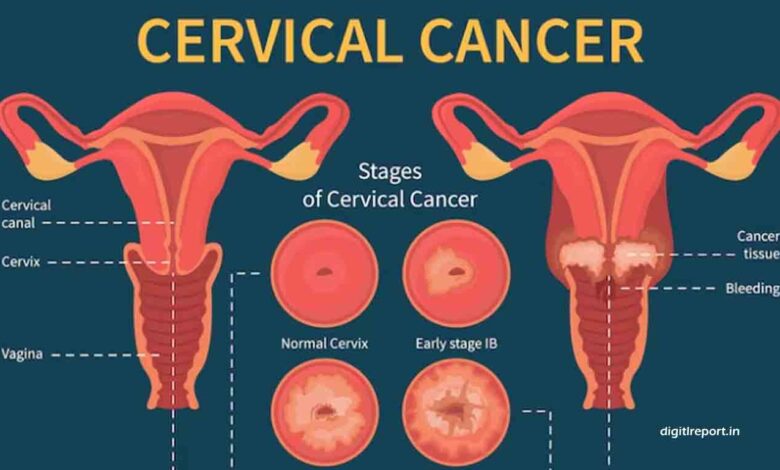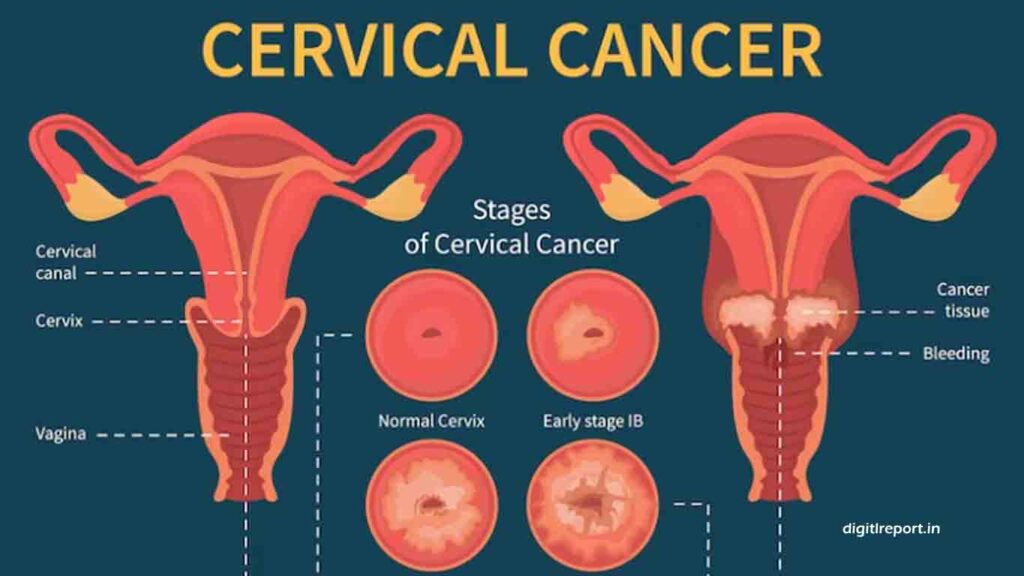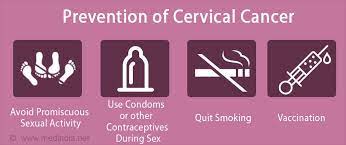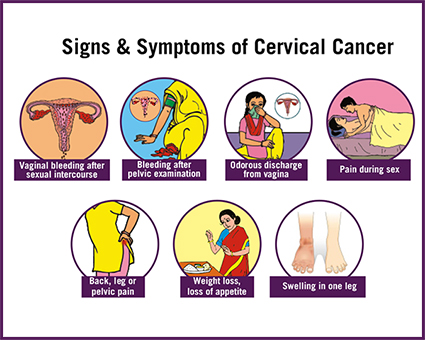

Cervical Cancer
Cervical Cancer It is most common cancer second to the breast cancer. it forms in tissues of cervix organ connecting uterus and vagina].cervical cancer is very slow growing in nature that may not have early symptoms, caused by human papillomavirus[HPV]. after viral infection 20 years later can be detected.it shows no early symptoms but can be found with Pap smear test(in this procedure cells from cervix scrapped and examine under microscope.
Risk Factors
1. Human Papillomavirus (HPV)
One of the main causes of cervical cancer is a virus called Human Papillomavirus, or HPV for short. This virus is very common and can be spread through sexual contact. Not all types of HPV cause cancer, but some can lead to the development of cervical cancer over time.
2. Smoking
Did you know that smoking can increase your risk of getting cervical cancer? It’s true! Smoking damages the cells in your cervix and makes it more likely for cancer to develop. So, if you don’t want to increase your chances of getting cervical cancer, it’s best to stay away from smoking.
3. Weak Immune System
If your immune system is weak, it can have a harder time fighting off infections, including HPV. This means that if you have a weak immune system, you may be more susceptible to developing cervical cancer. It’s important to take care of your immune system by eating healthy foods, getting enough sleep, and staying active.
4. Family History
Sometimes, cervical cancer can run in families. If someone in your family has had cervical cancer, you may have a higher risk of developing it too. It’s important to talk to your doctor about your family history so they can help monitor your health and catch any potential problems early.
5. Long-Term Use of Birth Control Pills
Using birth control pills for a long time can slightly increase your risk of getting cervical cancer. However, it’s important to note that the benefits of using birth control pills usually outweigh the risks. If you have any concerns, make sure to talk to your doctor.
6. Early Sexual Activity
Engaging in sexual activity at a young age can increase your risk of getting cervical cancer. This is because the cervix is still developing and is more vulnerable to infections. It’s important to wait until you are older and more mature before becoming sexually active.
Conclusion
While there are several risk factors for cervical cancer, it’s important to remember that having one or more of these factors doesn’t mean you will definitely get the disease. By taking care of your health, getting regular check-ups, and practicing safe behaviors, you can reduce your risk of developing cervical cancer. Remember, knowledge is power, so make sure to educate yourself and others about the causes and prevention of cervical cancer.
Preventing from Cervical Cancer

Prevention
Hey there, middle schoolers! Today, we’re going to talk about how to prevent cervical cancer. It’s important to take care of our bodies and make sure we stay healthy. So, let’s dive in!
Get Vaccinated
One way to prevent cervical cancer is by getting vaccinated against HPV. HPV is a virus that can cause cervical cancer, so getting the vaccine can help protect you. Talk to your doctor or parents about getting the HPV vaccine.
Regular Cervical Screening
Another way to prevent cervical cancer is by getting regular cervical screenings. These screenings can catch any early signs of cancer or abnormal cells in your cervix. Two common tests are the Pap smear test and colposcopy. Don’t worry, they’re not as scary as they sound!
Use Condoms
Using condoms during sexual activity can also help prevent cervical cancer. Condoms can reduce your risk of getting HPV, which is a major cause of cervical cancer. So, remember to practice safe sex and use protection.
Avoid Carcinogenic Factors
Lastly, it’s important to avoid direct exposure to carcinogenic factors. Carcinogens are substances that can increase your risk of developing cancer. Some examples include smoking, exposure to secondhand smoke, and certain chemicals. Stay away from these harmful substances to protect yourself.
Remember, prevention is key when it comes to cervical cancer. By taking these steps, you can reduce your risk and stay healthy. Take care of yourself and always talk to a trusted adult if you have any questions or concerns. Stay safe!
Signs and Symptoms of Cervical Cancer

Vaginal Bleeding After and Menopause
If you notice any bleeding from your vagina after you’ve gone through menopause (which is when you stop getting your period), it could be a sign of cervical cancer. This is something you should definitely talk to a doctor about.
Irregular Periods or Heavy and Longer Periods
If your periods are all over the place and not coming at regular times, or if they are really heavy and last longer than usual, it could be a sign of cervical cancer. It’s important to pay attention to any changes in your menstrual cycle and let a doctor know.
Vaginal Discharge with Strange Odor, Watery, or Containing Blood
If you notice any unusual changes in your vaginal discharge, like a strange smell, watery consistency, or if it contains blood, it could be a sign of cervical cancer. Don’t ignore these changes and make sure to get checked by a doctor.
Pain and Bleeding While Urinating
If you experience pain or notice any bleeding while you pee, it could be a sign of cervical cancer. This is something you should definitely talk to a doctor about as soon as possible.
The Different Stages of Cervix Cancer
First Stage: Only in the Top Layer of Cells or Abnormal Cells Only
In the first stage of cervix cancer, the cancer is only found in the top layer of cells or there are only abnormal cells present. This means that the cancer has not spread beyond this layer yet.
Second Stage: Cancer is Small and in One Area
During the second stage, the cancer is still small and confined to one area. It has not spread to other parts of the body. This is a crucial stage where early detection and treatment can be very effective.
Third Stage: Spread to Tissues and Lymph Nodes Around
In the third stage, the cancer has spread beyond the initial area and has reached nearby tissues and lymph nodes. This means that the cancer cells have started to invade and affect other parts of the body.
Fourth Stage: Can Spread to Other Parts of the Body
At the fourth and final stage, the cancer has spread to other parts of the body. This is the most advanced stage of cervix cancer and requires immediate medical attention. Treatment options may vary depending on the extent of the spread.
Also Read: which stool colour which disease indicates
At this stage, it is crucial for patients to consult with their healthcare team to determine the most appropriate treatment plan. The goal of treatment is to control the spread of cancer, alleviate symptoms, and improve the patient’s quality of life. Depending on the extent of the cancer’s spread, treatment options may include surgery, radiation therapy, chemotherapy, or a combination of these approaches.
The healthcare team will carefully evaluate the individual case and consider factors such as the patient’s overall health, age, and personal preferences when determining the best course of action. It is important for patients to have a strong support system in place during this challenging time, as emotional and psychological support can greatly contribute to their well-being throughout the treatment process.




